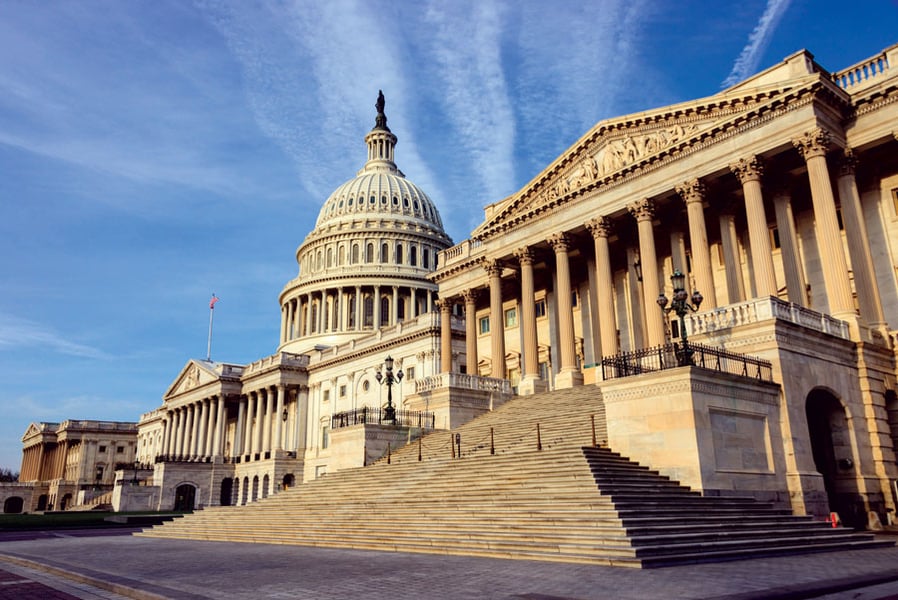

The U.S. House of Representatives on Wednesday narrowly approved a package of bills that would require public companies to disclose environmental, social and governance factors related to their businesses.
The Democratic-majority House voted almost entirely along party lines, 215-214, to pass the Corporate Governance Improvement and Investor Protection Act. No Republicans voted for the bill, and four Democrats voted against it.
Under the legislation, companies would have to provide to shareholders information about employee and executive pay, political spending, climate risk and tax reporting.
The vote came a day after a Securities and Exchange Commission deadline for public comment on expanding climate change disclosure. On Wednesday, SEC Commissioner Allison Herren Lee predicted the agency would propose an expansion of climate-risk reporting by the end of the year.
The House legislation combines five measures, including one written by Rep. Juan Vargas, D-Calif., that directs the SEC to define ESG metrics and requires companies to explain annually how they affect business strategy.
Another of the underlying bills, written by Rep. Sean Casten, D-Ill., directs the SEC to issue rules within two years requiring companies to report climate metrics, such greenhouse gas emissions and fossil-fuel-related assets, describe their climate-risk mitigation and assess the impact of climate change on valuation.
The partisan vote in the House signals the umbrella ESG legislation likely will have difficulty getting through the Senate, which is split evenly between Democrats and Republicans. Senate Republicans can stage a filibuster that requires 60 votes for passage of most bills.
Partisan lines were drawn in the House.
Democrats argued that investors are demanding ESG information from companies. Rep. Maxine Waters, D-Calif. and chairwoman of the House Financial Services Committee, zeroed in on ESG reporting currently being voluntary.
“It is surprising that to this day there are no explicit ESG requirements, and our investors are left to piece together the story of a company’s material risks with insufficient information,” Waters said during the House floor debate. “This is unacceptable. This package is the right thing to do for investors and our markets. It is past time that Congress make ESG requirements explicit.”
Republicans countered that ESG legislation is more about politics than financial performance.
“Let’s be clear, my friends across the aisle are using the federal securities laws to implement their partisan wish list of social policy priorities,” said Rep. Bill Huizenga, R-Mich. and a member of the House Financial Services Committee. “They are doing it through a mandatory disclosure regime that, at best, is tangentially related to investment decisions. To be clear: if information presents a material investment risk to a public company, the company is — wait for this — already required to disclose it.”
Republicans have resisted both ESG legislation and the flurry of ESG oversight activity at the SEC under a 3-2 Democratic majority that includes SEC Chairman Gary Gensler and Democratic members Caroline Crenshaw and Lee.
In an online appearance at a US SIF conference on Wednesday, Lee said the SEC is poised to expand ESG disclosures, with a climate-risk proposal likely to be released later this year. The public will have another chance to comment on the proposal.
“At every step along the way, the agency has and will continue to engage with market participants and the public to ensure that we’re proceeding carefully, deliberatively and based on the best available data,” Lee said. “[W]e need to move swiftly and we also need to craft … rules that will work to give investors the information they need and give issuers the certainty they need and to support our financial system and our economy.”
Lee said the SEC also should tackle stand-alone rules on disclosure of human capital metrics, such as diversity, and political spending.
“Beyond considering which specific ESG topics may be suitable for rulemaking in the shorter term, we need to consider how to establish a comprehensive framework for ESG disclosure that will capture the relevant, decision-useful ESG data that investors need,” Lee said.

Executives from LPL Financial, Cresset Partners hired for key roles.

Geopolitical tension has been managed well by the markets.

December cut is still a possiblity.

Canada, China among nations to react to president-elect's comments.

For several years, Leech allegedly favored some clients in trade allocations, at the cost of others, amounting to $600 million, according to the Department of Justice.
Streamline your outreach with Aidentified's AI-driven solutions
This season’s market volatility: Positioning for rate relief, income growth and the AI rebound
